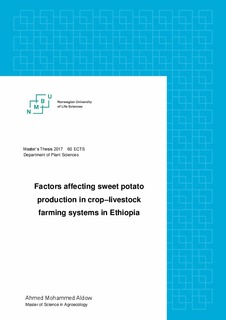Factors affecting sweet potato production in crop–livestock farming systems in Ethiopia
Master thesis
Submitted version
Permanent lenke
http://hdl.handle.net/11250/2449180Utgivelsesdato
2017Metadata
Vis full innførselSamlinger
- Master's theses (IPV) [240]
Sammendrag
Sweet potato is a potential food security crop in the crop–livestock systems for subsistence small-scale farmers in sub-Saharan Africa. This study investigated social, ecological, and economic factors, as well as how livestock influence sweet potato production in the Southern Tigray and Wolayita zones in Northern and Southern Ethiopia, respectively. The research in each zone was stratified in low, middle, and high altitudes. Structured questionnaires were randomly distributed to 120 respondents; 60 in each zone, and 20 in each altitude. Nine informant interviews were conducted with researchers and local agricultural offices in the study areas. Informal interviews, transect walks, participation in planting, and discussions were also carried out during the two periods of fieldwork. Statistical Package for the Social Sciences (SPSS) was used to analyze the questionnaires. In both zones, results showed that pests and diseases, rain shortage, drought, and lack of adaptable cultivars for different conditions influences sweet potato production. In Southern Tigray, lack of knowledge about sweet potato and planting materials prevented farmers from planting the crop. In Wolayita, farmers have lost their sweet potato landraces. Livestock provided manure, draught power, and to supplement farmers’ diets. This study suggests that Farmers Field School could improve farmers’ knowledge, agronomical practices, and yield. A participatory breeding programs for drought-tolerant, high-yielding varieties, that are rich with nutrients, and resistant to pests and diseases is needed.

